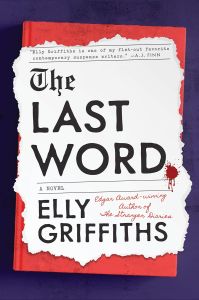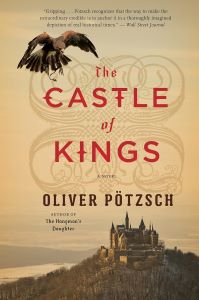The secret sauce in English crime fiction? Language.

The British are big on detective series, whether it’s television or books. There is the wonderful TV show “Shetland,” based on the book series by Ann Cleeves, but there’s also a raft of others. A recent find is the Ruth Galloway series by Elly Griffiths about a forensic archeologist in Norfolk, England, who heads the department at the fictional University of North Norfolk.
Griffiths ventures to Sussex — and away from the Galloway series — in The Last Word, which features a later duo, Edwin, who uses his advanced age (84) as a cloak of invisibility, and Natalka, a Ukrainian-born math whiz who is 50 years younger.
The list of British detective stories is long, of course, beginning with Sherlock Holmes and ranging up to Inspector Morse and the Midsomer Murders. Even J.K. Rowling, writing as Robert Galbraith, turns her hand to mystery with the Cormoran Strike series in books and on television.
My newest discovery, courtesy of the Financial Times, is the DC Smith series from Peter Grainger. Detective Sergeant Smith is also based in Norfolk, which is a popular setting for U.K. mysteries. The first installment, An Accidental Death, starts with a drowning that to all appearances is an accident, but then the mystery deepens. Smith, peculiarly, doesn’t want to retire, even though the powers-that-be would like him to.
And let’s not forget that Agatha Christie herself — creator of innumerable books featuring Hercule Poirot and Miss Marple — was English. Further, Lord Peter Wimsey, Adam Dalgliesh, Father Brown, and a host of other fictional sleuths also live and breathe their Englishness.
England is very old, and these books and TV series are redolent with history. (American readers may scramble to absorb that history.) Onscreen adaptations naturally feature British actors with posh accents, but it’s the language itself, the earthiness of the Anglo-Saxon heritage, that grabs your attention.
I’ve written before about that earthiness as it applies to authors in general, but it may be even more applicable to crime writers. In that prior column, I mentioned Rennie Airth (who was born in South Africa but wrote for Reuters for many years and sets his mysteries in England). His books feature Scotland Yard inspector John Madden, a damaged survivor of World War I.
Airth, who retired to Tuscany, is a prime demonstrator of the vigor of British English, which is much closer to its Anglo-Saxon roots. American English relies more heavily on Latin, which was grafted onto the Germanic language at the time of the Norman invasion. It’s hard to put your finger on it, but you know immediately if you’re dealing with an English detective or with, say, Ross MacDonald’s Lew Archer or Walter Mosley’s Easy Rawlins.
There’s the old saw about England and the U.S. being two nations divided by a common language, but there’s a kernel of truth in it. One is tempted to say, “Viva la difference,” but that would truly tilt the playing field.
Darrell Delamaide, a writer and journalist in Washington, DC, lived and worked in Germany and France for two decades.

